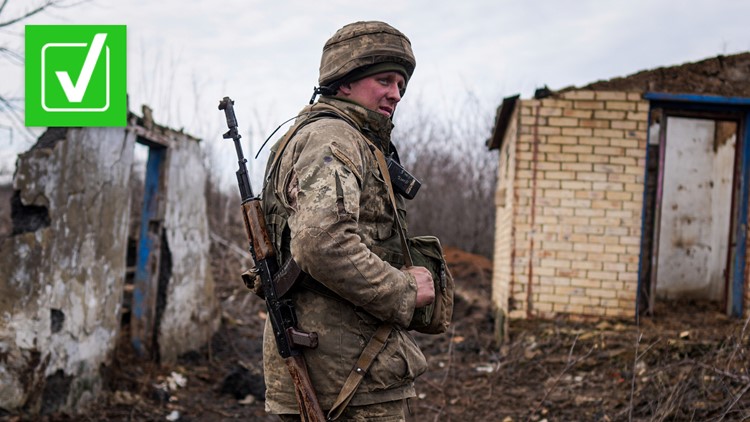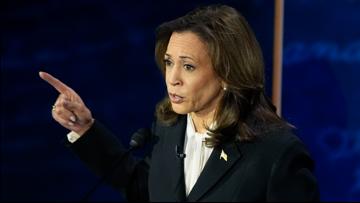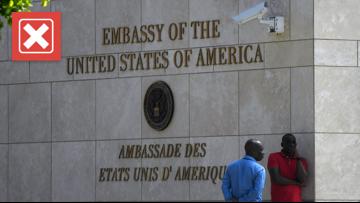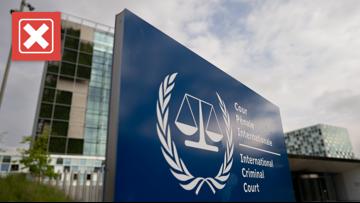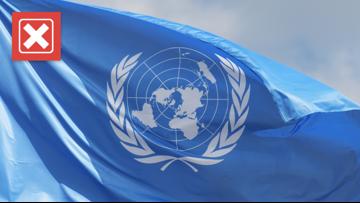On Feb. 21, Russian President Vladimir Putin announced Russia would recognize the Donetsk People’s Republic and the Luhansk People’s Republic, which are two separatist governments on the border of Ukraine and Russia, as independent from Ukraine. He then ordered Russian troops to move into the territories for what he claimed would be “peacekeeping” operations.
Both President Joe Biden and European Commission President Ursula von der Leyen immediately condemned the move as illegal, citing international law.
“Who in the Lord’s name does Putin think gives him the right to declare new so-called countries on territory that belonged to his neighbors?” Biden said in remarks the next day. “This is a flagrant violation of international law, and it demands a firm response from the international community.”
Von der Leyen issued her response over Twitter, where she said, “The recognition of the two separatist territories in Ukraine is a blatant violation of international law, the territorial integrity of Ukraine and the Minsk agreements.” Her tweet was liked more than 43,000 times.
THE QUESTION
Did Russia violate international law by recognizing the independence of two Ukrainian territories and sending in its military?
THE SOURCES
THE ANSWER
Yes, Russia violated international law by recognizing the independence of two Ukrainian territories and sending in its military.
WHAT WE FOUND
In 2014, rebels in two regions of eastern Ukraine, both bordering Russia, declared they were newly independent countries now separate from Ukraine. Although Russia did not formally recognize the territories were independent from Ukraine at that time, Russia backed the rebels in their war with Ukraine. Fighting has continued since 2014 despite multiple short-lived ceasefires.
On Feb. 21, 2022, Russian President Vladimir Putin announced Russia was formally recognizing the territories as their own countries, and Russia would move its military into the regions to support them. No other country that is a part of the United Nations (UN) has joined Russia in recognizing their independence.
The United Nations (UN) Secretary-General stated Russia violated the principles of the Charter of the United Nations; both Russia and Ukraine are members of the UN, and all members of the UN agree to and are supposed to abide by the UN Charter. The UN Charter states that its members shall not threaten or use force to change another country’s territory — what international law calls “territorial integrity.”
Russia’s move is also a violation of the 1975 Helsinki Final Act, which the Soviet Union signed and the countries that were created by its breakup — including both Russia and Ukraine — abide by. The Helsinki Final Act also forbids the countries who signed it from violating other signees’ “territorial integrity,” and forbids the use of force to achieve it.
The Helsinki Final Act does acknowledge the borders of countries may change over time, but it says borders may change “in accordance with international law, by peaceful means and by agreement.” That means any country involved in the change of a country’s territory — in this case, Ukraine and its rebel governments — must peacefully agree on that change.
The Budapest Memorandum, which Russia signed alongside the United Kingdom and the U.S. in 1994, confirmed the three countries’ commitment “to respect the independence and sovereignty and the existing borders of Ukraine.” The borders of Ukraine back in 1994 are the same borders Ukraine had in 2014, before Russia annexed Crimea and rebel groups in eastern Ukraine declared their independence.
Finally, the 1970 Declaration on Principles of International Law concerning Friendly Relations says that assisting a rebel group in another nation would threaten the target country’s “territorial integrity.”
“Every State has the duty to refrain from organizing, instigating, assisting or participating in acts of civil strife or terrorist acts in another State or acquiescing in organized activities within its territory directed towards the commission of such acts, when the acts referred to in the present paragraph involve a threat or use of force,” the declaration says.
Is Russia violating the ‘Minsk Agreements?’
Ursula von der Leyen, President of the EU Commission, accused Russia of not just violating international law, but of violating the “Minsk agreements.” These agreements are ceasefires in the conflict. All sides of the conflict, both Russia and Ukraine included, have violated the Minsk agreements.
The “Minsk Agreements” are a pair of two separate ceasefire agreements: after the first agreement failed to stick, the second agreement, Minsk II, was agreed to by Ukraine, Russia, France and Germany in 2015.
While Minsk II’s focus was on ending the violent conflict, it also said Ukraine would get full control over its border with Russia throughout the rebel-held area, and the two territories would remain a part of Ukraine with more legal independence from Ukraine’s central government than they had before.
When Putin acknowledged the Minsk II agreement in his speech announcing Russia would recognize the rebel territories as independent, he did so to accuse Ukraine of violating the agreement. The Minsk II agreement also required Ukraine to enact a new constitution — this would give those regions more legal independence, called autonomy — by 2015, but as of Feb. 23, 2022, Ukraine is still using its old constitution from 1996.
And neither side has stopped fighting for very long at any point since the Minsk II agreement was signed.
“Since [the Minsk II agreement] progress has been limited,” a European Parliament report from March 2020 said, “violations of the ceasefire continue to flare up along the line of contact.”
More from VERIFY: No, Ukraine is not a member of NATO, but the country has applied to join

